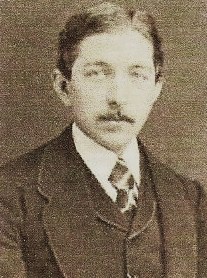Rudolf Lochner the Elder
Rudolf Lochner ( also known as the elder because of his son of the same name ; * October 28, 1847 in Aachen ; † January 5, 1918 there ) was a German entrepreneur in the textile industry.
Live and act
The youngest son of the cloth manufacturer Johann Friedrich Lochner and Julie Friederika Erckens, a sister of the cloth manufacturer Oskar Erckens , found his first job in his parents' company, the Lochner cloth factory , after completing a commercial apprenticeship . In 1870 Rudolf Lochner became a member of Club Aachener Casino and took part in the Franco-German War as a lieutenant in the infantry , during which he received the Iron Cross .
After his father had almost completely withdrawn from the operational business of the cloth factory during this period, Rudolf Lochner became a further partner in the company alongside his older brothers Emil (1832–1900) and Fritz Lochner (1835–1904) after his return from the war . Rudolf Lochner was primarily responsible for the commercial and administrative tasks, while Emil was in charge of technical management and Fritz was in charge of sales. At a time when the Aachen cloth industry was booming in the 70s and 80s of the 19th century, Rudolf Lochner played a key role in the modernization of the cloth factory and the new construction of the factory in 1873, as well as the storage and office space, and thereby helped the company to gain international reputation.
After the death of his brother Emil in 1900 and the retirement of his brother Fritz as co-owner, Rudolf Lochner continued to run the company as a sole partner and later converted it into a GmbH . It gradually became clear, however, that neither his sons nor his nephews showed any interest in joining the family business. As a result, Lochner was forced to liquidate the cloth factory from 1907, also because there were no buyers who were willing to continue the company. The traditional factory buildings between Karlsgraben, Mauerstraße and Lochnerstraße in Aachen, which have been family-owned for generations, later passed into the hands of the brothers Eduard Friedrich Hugo and Karl Hugo Heusch, who owned the needle factory Hugo Heusch & Cie. , formerly Butenberg & Heusch , and which was integrated into the Rheinische needle factory in 1955 by Karl Hugo .
family
Rudolf Lochner was married to Gertrud, b. Philips (1853–1945), a daughter of the tobacco manufacturer Johann Philips (1828–1891), the brother of Frederik Philips , who founded the Philips Group with his sons Gerard Philips and Anton Philips . It was characterized by its robustness and cosmopolitanism, which was preserved well into old age. A few months before her death, after the Allies took Aachen on October 21, 1944, at the age of 91, she was employed by the Americans as an interpreter due to her excellent knowledge of English.
Together, Rudolf and Gertrud Lochner had four sons and three daughters, of whom Arthur (* 1874) became a lawyer, Gustav (* 1875) a medical doctor and Hermann (* 1881) an interior designer and the youngest son Rudolf Lochner worked as an industrialist and builder. The daughter Adele Rosa Else Lochner (* 1878) remained connected to the cloth industry through her marriage to the cloth manufacturer Eugen Robert Oskar Peltzer (* 1871), which after the liquidation of the company inherited from her father Otto Peltzer, Otto Peltzer & Co in Aachen-Steinebrück , from 1915 a partner in the largest cloth factory in the Rhine Province , the C. Delius Aachen cloth factory . Daughter Martha Julie Philippine Lochner (* 1877) also married into a family of cloth manufacturers. She married Oscar Peters (* 1863), the youngest son of the Eupen cloth manufacturer Wilhelm Peters. In 1893, Oscar Peters acquired the mechanical engineering company Neuman & Esser , whose headquarters are today in Übach-Palenberg . The grandson of Martha and Oscar Peters, Klaus Peters (* 1937), initiated the Neuman & Esser Foundation of the Peters family, whose primary goal is to obtain evidence of Protestant entrepreneurship in Aachen.
Rudolf Lochner found his final resting place in the evangelical part of Aachen's Westfriedhof .
Literature and Sources
- Eduard Arens, Wilhelm L. Janssen: History of the Club Aachener Casino , new ed. by Elisabeth Janssen and Felix Kuetgens , Aachen
- Hermann Friedrich Macco : History and genealogy of the Peltzer family , contributions to the genealogy of Rhenish noble and patrician families, Volume 3, C. Georgi, Aachen, 1901
- Entry in the historical address book of the city of Aachen, 1889
- Documents and vita in the private archives of the Haniel and Lochner families - in Duisburg and Münster
- Rita Mielke (ed.): Neuman & Esser 1830–2005 , Grenz-Echo-Verlag Eupen (B), 2005, ISBN 90-5433-207-7
- Thomas Lochner: The story of the Aachen cloth manufacturer Johann Friedrich Lochner and his family , Schnell-Verlag, Warendorf 2013, pp. 87–96
Web link
| personal data | |
|---|---|
| SURNAME | Lochner, Rudolf the Elder |
| ALTERNATIVE NAMES | Lochner, Rudolph; Lochner, Rudolf |
| BRIEF DESCRIPTION | German entrepreneur in the cloth industry |
| DATE OF BIRTH | October 28, 1847 |
| PLACE OF BIRTH | Aachen |
| DATE OF DEATH | January 5, 1918 |
| Place of death | Aachen |
